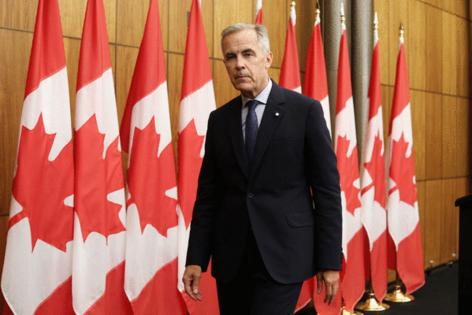Carney says he'll look at opportunities to remove tariffs on US
Published in News & Features
Prime Minister Mark Carney said Canada will look at whether to remove some counter-tariffs against the U.S., despite winning an election in which he pledged to fight back against President Donald Trump’s trade war.
Carney said retaliatory tariffs should be designed to maximize the impact on the U.S. but minimize the pain for Canadian businesses. When the U.S. changes its tariff rate, “we don’t automatically adjust. We look at what we can do for our industry that’s most effective,” he said in West Kelowna, British Columbia.
“In some cases, that will be to remove tariffs. We have removed some tariffs over time so that, for example, the auto industry can function more effectively. And we’ll look at opportunities to do so.”
The comments underscore a politically awkward position for Carney as he seeks to minimize economic damage while also standing firm against Trump. The U.S. president has imposed a broadside of tariffs and infuriated many Canadians by saying their country should be a 51st U.S. state. Polls show there’s strong appetite among the Canadian public for a hardball approach to the trade talks.
But some economists, businesses and provincial premiers have warned against escalation with the U.S. And Carney has tried to soften the blow of Canada’s counter-tariffs, which apply to tens of billions of dollars worth of U.S. products, by creating exemptions.
To help the auto sector, in April Carney offered tariff relief to carmakers — if they invest and keep production in Canada. In June, he said the government would adjust its existing counter-tariffs on steel and aluminum based on discussions with the U.S. But the US has since raised some tariffs, but Canada has not retaliated.
Carney narrowly won an election in April touting slogans like “Canada Strong” and “Elbows Up,” the latter phrase meant to evoke warding off belligerent opponents in the national sport of hockey.
Carney’s main political opponent, Conservative Party Leader Pierre Poilievre, mocked the phrase by saying the prime minister’s tenure was more a case of “elbows down and tariffs up.”
‘They’re an Irritant’
If Canadians expected other countries to follow suit in retaliation, the months since have proved disappointing. Although the European Union and Mexico have threatened measures against the U.S., they have held off, leaving Canada and China as the only countries to punch back with their own sizable counter-tariffs.
The White House cited Canada’s retaliation as part of the justification for increasing headline tariffs to 35% from 25% on some Canadian products last week. The majority of goods, however, remain exempt, covered by the U.S.-Mexico-Canada trade deal Trump signed during his first term in office.
Pete Hoekstra, the U.S. ambassador to Canada, told the Canadian Broadcasting Corp. that Trump’s policy is “tariffs for every single country in the world.” Canada would likely have to remove its counter-tariffs as part of any trade truce, the diplomat said. “They’re an irritant right now.”
Last month, British Columbia Premier David Eby told Bloomberg he didn’t think additional counter-tariffs would change Trump’s mind, but could still inflict harm on his province. That’s because it’s difficult for BC businesses to replace American steel and aluminum by paying to ship the heavy commodities from Canadian smelters in the east, thousands of miles away by rail.
Nonetheless, Canadian voters still favor a “hardball” response, refusing concessions, according to polling by Angus Reid released Friday.
____
(With assistance from Melissa Shin.)
©2025 Bloomberg L.P. Visit bloomberg.com. Distributed by Tribune Content Agency, LLC.







Comments